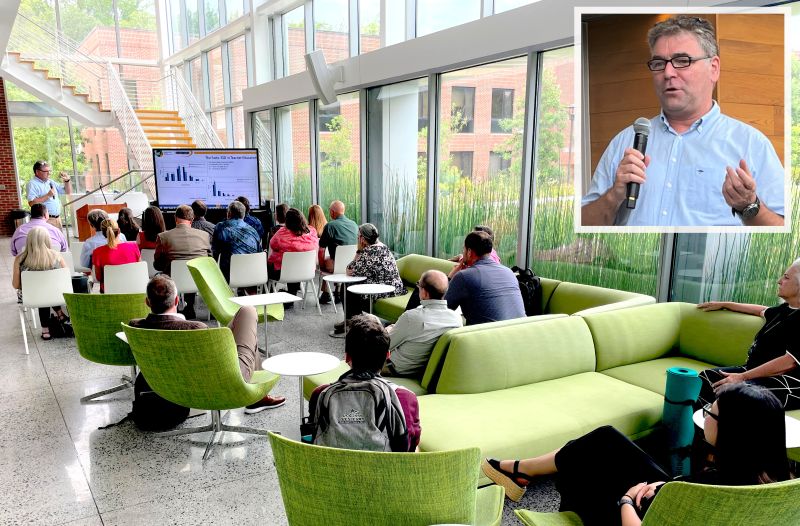Share this Story
VWU Hosts German Sustainability Scholar
Heidelberg University Professor offers German Perspective on Environment, Climate Change, and Education
University News | August 1, 2023
Ask Dr. Alexander Siegmund about the future of environmentally sustainable development (ESD) and he will tell you that it all hinges on mindset. “Most people are against harming the environment,” he says. “It’s easy to be against something, but it’s much different to be for what is required to address it.” When it comes to the environment, being for the solution requires a much greater level of commitment and knowledge.
As Founding and Managing Director of the Heidelberg Center of Education for Sustainable Development (ESD Center) at Heidelberg University of Education, Dr. Siegmund is dedicated to changing the mindset toward these issues, one teacher at time. The aim of the ESD Center is to implement and support essential changes of outlook and behavior across disciplinary and institutional boundaries.
As part of our ongoing partnership with Heidelberg University of Education, Virginia Wesleyan University hosted Dr. Siegmund for a two-day campus visit, meeting with science faculty to discuss common research and possibilities for international partnerships, scholarly projects, and student exchanges. He also engaged with our partners at the Virginia Aquarium and Marine Science Center to meet with educational outreach staff, as well and the Brock Environmental Center and the Norfolk Botanical Garden to see how sustainability is being addressed with the public here in the states. To cap off his visit, Dr. Siegmund spoke with some of our aspiring teachers and education faculty about how Germany teaches ESD in its K-12 schools. 
At Heidelberg University of Education, every subject includes some element of ESD, not just science classes, but subjects like math, history, literature, and geography as well. Over the past five years, Dr. Siegmund and his colleagues have developed an adaptive learning platform that is utilized to help students become more engaged with the environment. What’s more, they can earn points for attending certain lectures, seminars, and poster presentations. The more ambitious can become certified as “sustainability scouts” who are then sent out into the community to give presentations at nearby schools. Most recently, the University has developed a master’s degree in Digital ESD which aims to produce experts who can employ a myriad of digital platforms to educate the public on issues related to sustainability and climate change.
Through these efforts, Heidelberg University of Education is striving to produce a new generation of educators who can help influence the mindset of future citizens, as well as activists and leaders. The same can be said for Virginia Wesleyan University. In fact, it’s spelled out in our Environmental Guiding Principles:
Virginia Wesleyan University recognizes our responsibility to protect and enhance the environment and its biodiversity for the health of local and global ecosystems, future generations, and ourselves. We are committed to responsible stewardship of campus resources and to demonstrating leadership in sustainability. As a learning community located in the rich and unique ecosystems of Coastal Virginia and the Chesapeake Bay watershed, we are committed to promoting and developing the next generation of environmental stewards. The ongoing sustainability efforts of the University reflect a larger commitment to ethical conduct and social responsibility through environmental stewardship and education.
"It’s important to understand how our international partners address sustainability in higher education and K-12 schools,” says Dr. Bill McConnell, VWU Director of Teacher Education. “Climate and environmental issues are a global concern, so it benefits all of us when we share our best ideas to educate and address contemporary environmental issues with our students. This partnership, and Dr. Siegmund's visit, provides an avenue to do that."

